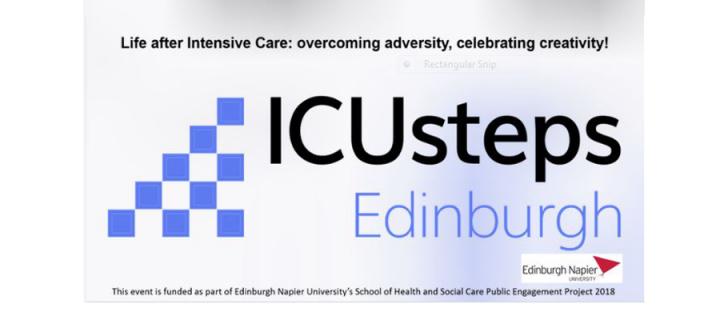ICUsteps patient and family support group celebrate first year
We are hosting a public engagement event on Thursday August 2nd, at the Thistle Foundation in Edinburgh.
It will be a friendly, informal affair. Former patients will share their experiences, their poetry and their art. We'd be delighted if you could join us! The audience will include interested members of the public; former Intensive Care patients; their family and friends, and practitioners from health and social care. Importantly, the event will also serve as a celebration of our first year as an ICUsteps patient and family support group.
Confirmed speakers include:
Rose (former patent)
George (former patient)
Mark (former patient)
Olivia (former patient)
Hans Clausen (NHS artist in residence),
Marianne Brennan (the ALLIANCE, Scotland Health & Social Care Collaboration)
We will be showing a short film from Bob (former patient), and artwork and excerpts from a film by Nancy Andrew, an American ICU survivor who suffered PTSD after ICU. Esteemed guests include Tommy Shepherd MSP.
Please do come and join us. Details and registration via Eventbrite:

Every year over 140, 000 people are admitted to an Intensive Care Unit (ICU) in the UK, over 75% of whom survive. Survivors of critical illness experience chronically impaired quality of life and protracted recoveries as a consequence of “Post Intensive Care Syndrome” (PICS). Physical symptoms include: muscle wasting, fatigue, generalised weakness, weight loss, joint pain/stiffness, breathlessness, hair loss and skin and voice changes. Rates of anxiety, depression and post-traumatic are high, and many patients suffer from cognitive impairment (impairments in memory, attention and executive function). Only around 50% of patients are able to return to work within a year of getting home.
Alongside narratives of lives forever changed, qualitative research with ICU survivors in Lothian has identified strong themes of “determination” resilience, spirituality and creativity; themes which are rarely celebrated in conventional literature or media. Some ICU survivors, for example, (re)discover creative writing, poetry or imagery and music, using it as a way to make sense of life-threatening illness and their changed lives. Others report “having a second chance at life”, and a strong desire to “give something back” e.g. by volunteering. This event provides a rare opportunity to showcase these more positive, therapeutic aspects of recovery, for the benefit of other patients and families involved in the process.

